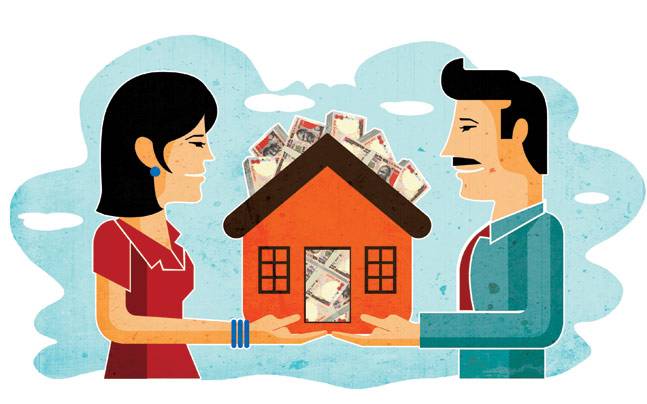Here Are 5 Important Things You Should Know Before Signing On The Home Loan Agreement
Home Loans India offered by the banks are primarily divided under below mentioned categories:
1. home loans india Understand Types Of Home Loans India
Home Loans India offered by the banks are primarily divided under below mentioned categories:
1.Adjustable or Floating rate loans
In this type of loan, the interest rate is linked to the lender’s benchmark rate. If there is a change in the benchmark rate, the interest rate get affected and changes accordingly.
2. Fixed rate loans
In a fixed rate loan, the interest rate is fixed at the time of taking the loan. This rate of interest is applicable throughout the tenure of the loan.
3.Combination Loans
These home loans India offers a part of the loan at a fixed rate of interest and part at an adjustable or floating rate of interest.
2. Know Your Eligibility Criteria
The foremost step you need to take is to make sure whether you qualify for housing loans or not. There are lot of things to undertake and most important thing is CIBIL score. The banks that are providing home loans will be assessing your eligibility on the basis of your income and repayment capacity. The other important considerations include age, qualification, financial position, number of dependent’s, spouse’s income and job stability.
3. Check Your CIBIL Score
The home loan eligibility depends on the credit worthiness as well of the individual. CIBIL offers a credit score on a scale of 300 to 900 based on your previous credit history as well as how you are maintaining your account presently, your current income, existing loans, loan repayments, how many times you have applied for a loan or a credit card. Individuals with a CIBIL score greater than 750+ are more likely to get a home loan.
The number of times you apply for the home loans India, CIBIL considers it as being credit hungry hence; reduces the chances of getting a loan are minimized. CIBIL rating, net salary excluding some variable heads and existing loans and EMIs being paid towards existing loans are the vital components which decide the repayment capacity of the applicant.
4. Final Home Loan Amount

Banks offering home loans in India sanctions the loan amount ranging from 75% to 90% of the cost of the property depending on your loan value. So for e.g. if the property valued is Rs. 50 Lac you can get home loan sanction of Rs. 40 Lac. again looking at your home loan eligibility.
If you include a co-applicant, his/her income can be considered by the lender to increase the loan amount. As a co-applicant you can include your adult child, parent or spouse. The balance payment towards purchase of the property is primarily to be contributed by you. For example, if the property is valued at Rs 50 lac and you have been sanctioned a home loan of Rs 30 lac only , your contribution will be the balance Rs 20 lac. You can use a housing loan eligibility calculator to check your eligibility criteria for applying a home loan.
5. Monthly Installments Affordability
The primary factor that influences home loan from the borrower’s view point is its EMI. You may not be aware of the monthly outflow which will go towards repaying the home loan for the at least the next 10-15 years is a big thing that you need to consider.
Do not over stretch yourself; thinking that you are bound to earn more in the future so you can push a bit and get more loan hence; take on additional EMI. As a golden rule never let your EMI exceed 40-45 % of your net monthly income. If you earn more, you can always pre-pay your loan with additional disposable funds as most banks do not charges for pre-payment penalties now-a-days.
6. Insurance Cover
It is important to count insurance cost when you are applying for home loans India. You must consider purchasing a loan cover term assurance plan that will cover the loan amount. It’s important to do your research to find out the best home loan insurance available.
This will relieve your family from the liability of an outstanding loan as the loan is repaid by the insurance company in case something unfortunate happens to you. In fact, several home loan lenders will insist that you purchase insurance at the time of taking the loan.
7. Lengthy Loan Tenure Means Costly Home Loan
An increase in the base rates means there’s an increase in their floating home loan rates. For the borrower it means a higher EMI. For a common man; it’s tough to afford an increased EMI hence; requests the bank to increase the loan tenure which brings down the monthly installment. It may feel a temporary relief if you are in a desperate situation, in the long term you actually end up paying more.
Consider a situation where you have taken a loan of Rs 30 lakh at 10.5% for tenure of 20 years. Your EMI will come at Rs 29,951 and the total interest you’ll have to pay on it will be Rs 41,88,240. Hence; the long tenures lets you pay more interest than your principle amount.
8. Tax Benefits
You are entitled to get an exemption of interest on home loan in India up to an amount of Rs. 150,000 and up to Rs. 100,000 on the principal amount. You make sure to avail these benefits. However; if you were to sell your property within the first 5 years, the tax you saved on interest payments will be added to your income from sale of property hence; which will be taxable.
9. Penalties and Other Charges
As such there should be no extra charges except for the processing fees, legal verification charges in some cases, stamp duty on home loan amount and certain switching charges if you were to change your EMI or transfer your loan to another bank or NBFC. However there will be certain penalty if you default on your payment along with added interest in some cases. Make sure you are aware of all these charges and ask the banks a list of charges applicable in all cases in writing; never take their word for anything. There may be some charges for releasing your property documents for photocopying purposes or any other, during the tenure of the loan.
10. Reading The Fine Lines
A home loan agreement is a legal document therefore; often incomprehensible. However; may be confusing terminology and hidden charges hiding in the details. Some banks have a security clause that makes that entitles the bank to demand additional security along with your loan amount in case property prices fall. Hence; if you fail to pay up, you will be marked as a defaulter.
Be careful about the add-on charges and penalties. It’s not just the interest that you pay. There are additional charges such as administrative and service charges or processing fees. Also, there are penalties like on pre-payment of the loan.




















































